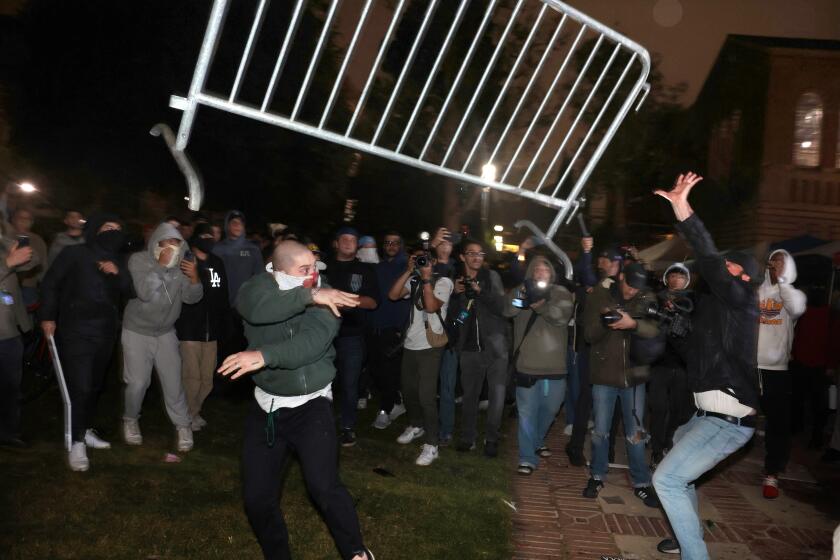Editorial: Raid on Kansas newspaper was possibly illegal — and definitely troubling

It was the sort of conduct one usually associates with totalitarian governments: Law enforcement officers swarm a newspaper office and confiscate computers, servers and cellphones of reporters and editors. Yet this raid took place not in a faraway autocracy, but in a small town in Kansas, despite a federal law prohibiting such searches in most cases.
On Friday, police acting on a warrant searched the offices of the Marion County Record, a weekly newspaper with seven employees and a circulation of about 4,000. Simultaneously, officers searched the home of Eric Meyer, the publisher and co-owner, seizing computers, his cellphone and the home’s internet router, according to Meyer. Meyer’s 98-year-old mother — a co-owner of the newspaper who lived with him — collapsed and died Saturday. Meyer blamed her death on the stress of the raid on their home.
Hydee Feldstein Soto has launched a misguided effort to weaken the state’s bedrock government transparency law.
Drastic as they were, the searches originated in what might appear to be a trivial dispute between the Record and a local restaurant owner, Kari Newell, who has accused the newspaper of invading her privacy and illegally accessing information about her and her driving record. (The newspaper says it obtained information about her driving record unsolicited and verified it through online public records; and it didn’t print a story referencing the information.) The search warrant alleged identity theft and unlawful use of a computer.
The searches left the small news operation in such a dire state that it was not clear whether it would be able to publish the next scheduled edition Tuesday evening; Meyer memorably described the police action as “an atomic flyswatter.”
It may also have been illegal. The federal Privacy Protection Act of 1980 requires that in most situations, law enforcement seek to obtain material from journalists through a subpoena — which gives the target the opportunity to make a legal challenge — rather than through a surprise search conducted with a warrant.
If local news goes out of business, the damage to our democracy will be severe and irreversible.
The 1980 law was passed after the Supreme Court upheld a search by sheriff’s deputies of Stanford University’s student newspaper seeking photographs from a protest. It serves as a necessary recognition that a free and inquisitive press serves the public interest, and that raids and searches of newsrooms can intimidate reporters and stop their vital work. The law broadly defines who is protected: those “reasonably believed to have a purpose to disseminate to the public a newspaper, book, broadcast, or other similar form of public communication.”
The law does contain an exception for situations in which “there is probable cause to believe that the person possessing such materials has committed or is committing the criminal offense to which the materials relate.” In a statement to NPR, Marion Police Chief Gideon Cody pointed to this exception to justify his department’s search of the Record.
It isn’t just journalists who should be outraged over what happened to freelance videographer Bryan Carmody in San Francisco last Friday: Police handcuffed him while they searched his home in an apparent bid to identify a confidential source.
That claim is unpersuasive. In a letter to Cody signed by the Los Angeles Times and more than 30 other news organizations, the Reporters Committee for Freedom of the Press noted that the suspect exception cited by the chief “is inapplicable when the relevant conduct consists of the receipt, possession, communication, or withholding of the material, with only limited exceptions for certain federal statutes that are not at issue here.”
These searches took place in a small town, but the temptation of law enforcement to overreach in dealing with journalists exists in communities of all sizes. In 2019, police in San Francisco searched the home and office of freelance journalist Bryan Carmody in an apparent bid to identify a confidential source. The city later agreed to pay Carmody $369,000 in a settlement.
Congress decided that journalists needed protection against searches. Local police and judges need to honor that judgment.
More to Read
A cure for the common opinion
Get thought-provoking perspectives with our weekly newsletter.
You may occasionally receive promotional content from the Los Angeles Times.







